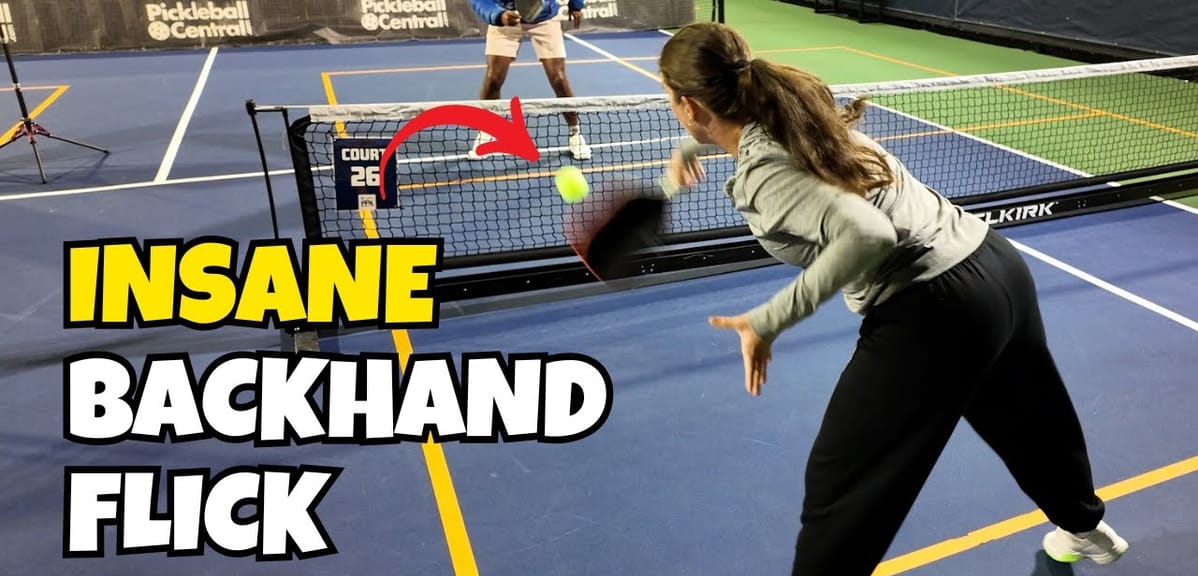
Mari Humberg shared the secrets behind her signature backhand flick in a recent video with pickleball content creator Ed Ju.
If you’ve ever wondered how she makes this shot look so smooth and effective, you’re in the right place.
This article, along with the video on Ed’s channel, will walk you through the details, from grip to execution, so you can add this versatile shot to your game.
The Grip: Where It All Starts
Mari’s backhand flick begins with her grip—a Continental-Eastern hybrid. This grip balances power and control, making it perfect for precision shots like her flick.
Think of it as starting in a handshake position and sliding your hand slightly downward. One critical factor to keep in mind: wrist flexibility is key. If your wrist doesn’t have much range of motion, you may find this shot challenging at first, but with practice and some stretches, you can improve over time.
The Flick vs. The Roll
One of the most common mistakes players make with this shot is trying to muscle it for power. As Mari explains, "People want to hit hard. You don’t have to hit a flick hard."
Here’s how her flick differs from a traditional backhand roll:
- It’s more of a toss motion, not a rolling swing.
- The paddle moves low-to-high, creating lift and spin.
- The wrist does most of the work, not the shoulder.
- Spin is the focus, while power takes a supporting role.
- Placement is key—aim for your opponent’s hips or any open spaces they leave on the court.
Why the Flick Works
What makes Mari’s flick so effective is its subtlety. It’s not about overpowering your opponent; instead, it’s about catching them off guard.
The flick is often one of the slowest winning shots in her arsenal, but that’s exactly what makes it so deceptive. Opponents expect power, but instead, they’re faced with a precise, spinning shot that’s hard to anticipate and even harder to counter.
Positioning: When to Use the Flick
Timing and positioning are crucial for executing the backhand flick. Mari recommends using it in these situations:
- When you’re well-balanced and have control of your positioning.
- To counter high dinks from your opponent.
- Against opponents who are caught in no-man’s land (mid-court).
- For cross-court flicks, stick to higher balls to ensure you maintain control and clear the net.
Shifting Your Mindset
Mari emphasizes that the goal of the flick isn’t necessarily to win the point outright. "The intention of an attack is not to hit a winner—it’s to set up for the second shot," she says.
This mindset shift is especially important at higher levels of play. The flick is a tool to disrupt your opponent’s rhythm and create opportunities to finish the point on your terms.
Tips for Practice
If you’re ready to add the backhand flick to your game, here are Mari’s tips to get started:
- Exaggerate the motion at first. Focus on a strong upward movement to generate spin.
- Prioritize spin over power. A well-placed, spinning shot is far more effective than a fast one.
- Dial in your trajectory. Aim for a low shot with a sharp dip.
- Practice small. Start with soft, controlled cross-court flicks to build consistency.
- Always stay prepared. After the flick, be ready for your opponent’s response.
Watch the full demonstration from Ed and Mari here:
The Bottom Line
The backhand flick isn’t a shot you’ll use every rally. It’s a specialty tool for specific situations, like handling higher balls where you can take advantage of spin and placement.
When executed well, it can change the dynamic of the point and leave your opponents scrambling. Remember to focus on smooth, controlled movements, spin over power, and staying ready for the next shot. With practice and patience, you’ll have a reliable weapon to add to your pickleball game.


Love Pickleball? Join 100k+ readers for free weekly tips, news & gear deals.
Subscribe to The DinkGet 15% off pickleball gear at Midwest Raquet Sports










